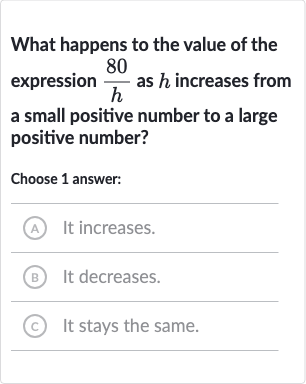Full solution
Q. What happens to the value of the expression as increases from a small positive number to a large positive number?Choose answer:(A) It increases.(B) It decreases.(C) It stays the same.
- Understanding the Relationship: Understand the relationship between the numerator and the denominator in the expression .As increases, what happens to the fraction as a whole?Since is a constant and is in the denominator, as increases, the overall value of the fraction decreases.
- Behavior as Approaches Infinity: Consider the behavior of the expression as approaches infinity.What is the limit of as approaches infinity?The limit of as approaches infinity is , which means the expression decreases towards as increases.
- Correct Description of Behavior: Choose the correct answer based on the behavior of the expression.Which option correctly describes the behavior of as increases?Option (B) "It decreases" is the correct answer because as gets larger, the value of the expression gets smaller.

